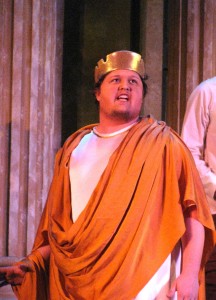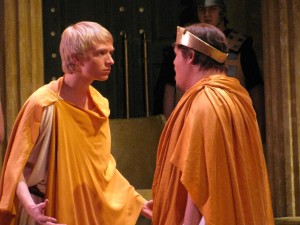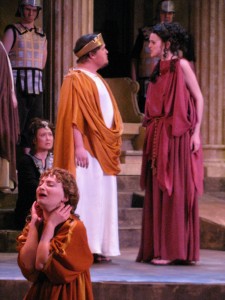 Abigail Willis may play the titular character in Sinclair Community College’s production of “Antigone,” but it’s Derek Dunavent as Creon who makes the show. Creon’s transformation from a slick-haired, prideful ruler into a disheveled wreck of a man is tragic, but remarkable.
Abigail Willis may play the titular character in Sinclair Community College’s production of “Antigone,” but it’s Derek Dunavent as Creon who makes the show. Creon’s transformation from a slick-haired, prideful ruler into a disheveled wreck of a man is tragic, but remarkable.
The play centers on Antigone’s quest to give her dead brother a proper burial despite Creon’s orders against it. Because burial rites were an important religious and cultural norm, this causes incredible divisions between the main characters, their families and the entire city of Thebes.
“Antigone” is performed in classic Greek style, so the language is very traditional and not always easy to understand. Joshua Scales, who voiced Audrey II in the recent production of “Little Shop of Horrors,” said he thought the show was pretty good despite the language.
“Sometimes in Greek theatre I can’t always understand what’s said, but in this play it’s really clear,” Scales said.
 One of Scales’ favorite scenes is Haemon’s response to his father Creon’s orders. Haemon, played by Steven Brotherton, tries using public opinion to change his father’s mind, but their discourse quickly deteriorates into a shouting match so intense they all but spit on each other.
One of Scales’ favorite scenes is Haemon’s response to his father Creon’s orders. Haemon, played by Steven Brotherton, tries using public opinion to change his father’s mind, but their discourse quickly deteriorates into a shouting match so intense they all but spit on each other.
The expressiveness of the actors is overwhelming. When Creon defends his decisions before the counsel, his face turns red. When Antigone argues with her sister Ismene, played by Tracie Puckett, their voices shake. Even the silence was overpowering; at times I was too shocked to breathe.
One of the most vibrant characters is the blind seer Teiresias, played by Melissa Kerr Ertsgaard, an alumnus of the 1990 production. Her passionate reprimand of Creon is one of the play’s best scenes.
The play features original music by Associate Professor John Parcell, who recently was named the Ohio Professor of the Year. The moody melody and long, solemn tones create an atmosphere that discourages laughter, yet maintains hope.
 The set and costumes are done in muted tones of brown, orange and purple. The cracked structures and broken columns hint at a crumbling city before the story even starts. The buildings seem to leave little room for the actors, but the cast makes up for it by using the orchestra pit as part of the stage.
The set and costumes are done in muted tones of brown, orange and purple. The cracked structures and broken columns hint at a crumbling city before the story even starts. The buildings seem to leave little room for the actors, but the cast makes up for it by using the orchestra pit as part of the stage.
Overall “Antigone” is worth seeing at least once, even if the classical style is hard to understand at first.
“Antigone” will be presented through Saturday, Feb. 27. For show times and tickets, click here.
Contributed photos by Terry Stump.

